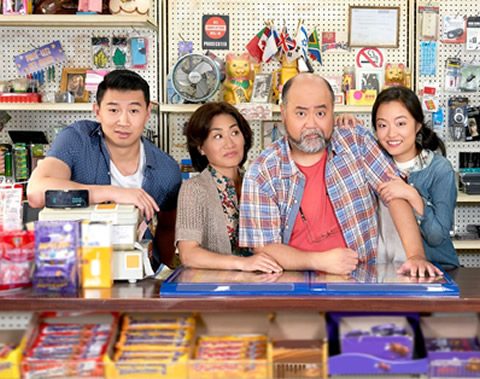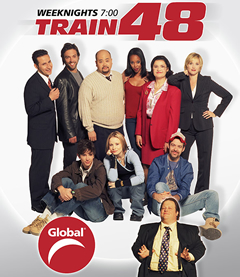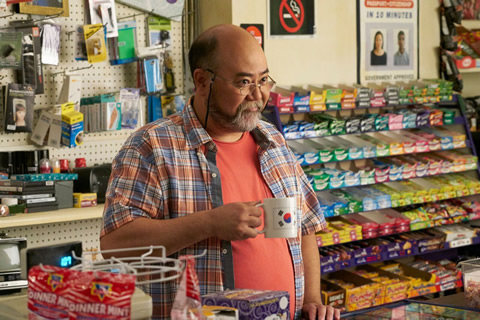Actor Paul Sun-Hyung Lee, the star of CBC’s new comedy Kim’s Convenience, has never been as busy with work as he is now. He says this as if he can’t quite believe his good fortune, having stumbled across a role a decade ago – Appa, the Korean owner of a convenience store in Toronto’s Regent Park – that’s gone on to define his career.
Lee, who is Korean-Canadian, helped playwright Ins Choi develop the character, and has been playing Appa almost continuously since 2011 when Kim’s Convenience debuted at Toronto’s Fringe Festival. As Lee tells U of T Magazine editor Scott Anderson below, he welcomes his success but finds it all a bit surprising, given his humble entry into acting through U of T’s drama program in 1991, which he attended until 1994 (although he never completed his BA), and initial wariness about entering a profession in which he thought “everyone was absolutely insane.”
Going into drama was a bit of a lark. I had no idea what I was getting myself into. The audition to get into the U of T drama program [now known as the Centre for Drama, Theatre and Performance Studies] was held in the basement of University College. There was a huge group of kids who had obviously taken high school drama. They were very serious about it. Some had their shoes and socks off and were stretching, so I started doing some lunges, trying to fit in. It was my first exposure to the performing arts and I thought everyone was absolutely insane. We had to line up and move across the room choosing a particular movement and a sound to accompany it. At the end, we all got into a circle and the instructor – Ken Gass – gave us a line to say. We had to step into the centre of the circle, say this line and step back out. The line was, “What a horrible, miserable, terrible day.” I thought, ‘This is perfect!’ I did it with such venom, I spat on the ground at the end.
I got into the program. And what happened was that learning from Ken in my first year at University College ignited inside of me a passion for the performing arts that I’d never had before.
It’s uncanny how so many of the scenes in Kim’s Convenience mirror my own family. That’s what drew me to the play. Like the characters of Umma and Appa, both of my parents were teachers in Korea who couldn’t teach when they came to Canada because of language. Like Umma and Appa, my parents had a store, and we lived above it. My parents wanted me to go into a profession where I wouldn’t have to struggle or worry about money. To see me go into a field that is all about struggling was devastating to them in some ways – though they were more supportive than Umma and Appa are to their daughter, Janet, who is a photographer. Now that I’m a dad, I can understand the courage it must have taken for my parents to pull up stakes in their homeland and move to another country so that their children would have better opportunities in life than they did.
For me, Kim’s Convenience is all about family. It’s about love. It’s about acceptance. It’s about sacrifice. It’s about how different generations are able to say “I love you” to each other. That is the thing has touched so many people, whether you’re Korean or not, and whether you’re from an immigrant family or not. This family never, ever doubts that they love each other. My own family – my two boys and my wife – is the end all and be all for me. My eldest is 12, in Grade 7, and my youngest is six. You see a reflection of yourself in your children, and you see a reflection of your parents in yourself.

Besides my family, I’m passionate about movies and comic books. I’m a self-professed geek. In the last few years, I’ve rekindled my love for Ghostbusters and right now I’m building a fully functional – well not fully functional – proton pack that lights up and has sounds. It doesn’t actually throw nuclear accelerated particles, but it’s something to do instead of buying a motorcycle or a convertible. I loved the Ghostbusters remake, but the amount of vitriol that came out because it was an all-female cast was absolutely shameful. I thought all the actors were fantastic.
I’ve lived with Appa for almost 10 years. He is this crazy, Archie Bunker-esque, irascible, boisterous, stubborn, jackass man who has an incredible amount of love for his family. There’s nothing overtly malicious about him. He truly believes he’s the smartest one in the room. But because I’m portraying an Asian character with an accent, people quickly jump to “he’s a caricature” or “he’s a stereotype.” And that’s unfortunate, because Appa is not a caricature. He’s a fully realized character, with hopes and fears, faults and strengths. He’s not a stereotype, he’s an archetype. I’m immensely proud of this character. I love playing him, and I’ve always tried to approach him with as much honesty, humility and authenticity as I can.

My first leading role where my ethnicity wasn’t foremost was on Train 48, an improvised soap opera that aired on Global TV in the early 2000s. Randy Ko was the first three-dimensional character I was allowed to play on television, and I’m proud to say he became a fan favourite – at least among the sci-fi geeks. For a long time that community was never portrayed positively on TV. I see faint echoes of that – of giving voice to people who for so long have not been heard – with Appa and the Korean community.
Audiences are hungering for diversity. Look at that Exodus: Gods and Kings debacle. How can you possibly set a movie in Egypt without casting Egyptians as leads? But director Ridley Scott has the audacity to say he can’t cast people of colour because no one would know who they are. The community woke up and said, “F— you, we’re not going to watch this movie.” And the movie tanked. These practices are no longer acceptable. The world is much smaller now. We can see fantastic actors from different cultures on Netflix at home. We are a multicultural society. It matters who the producers, directors and writers are. When you have diverse people making the decisions about what’s being made, you’re going to see more diversity on screens as well. The situation is way better than when I started acting 20 years ago, but it’s 2016 and we still have such a long way to go.
Next year is going to be insanely busy for me. And it’s going to be all Kim’s Convenience. We’re taking the stage production to Halifax, Toronto and Montreal. Then Soulpepper is taking Kim’s Convenience to off-Broadway in New York for a month-long festival of Canadian Soulpepper plays. We might also go to Korea to do a tour of the play. At the same time, I’m hoping we’ll be able to do a second season of the show. I’ve never been this busy professionally in my life!
Kim’s Convenience airs Tuesdays at 9 p.m. on CBC.
Watch a trailer for Kim’s Convenience:
Recent Posts
U of T’s 197th Birthday Quiz
Test your knowledge of all things U of T in honour of the university’s 197th anniversary on March 15!
Are Cold Plunges Good for You?
Research suggests they are, in three ways
Work Has Changed. So Have the Qualities of Good Leadership
Rapid shifts in everything from technology to employee expectations are pressuring leaders to constantly adapt






